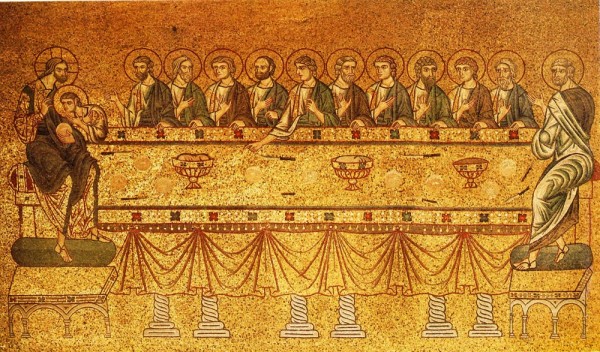Have you ever noticed that food is often at the center of controversies? Whether it’s eating meat sacrificed to idols in Corinth, figuring out how early Christians from Jewish and Gentile backgrounds could eat together, or even responding to the current hubbub about a chicken chain, what we put in our mouths and stomachs can easily involve us in disputes. Leaving those celebrated cases aside, our diets and eating habits have profound spiritual and moral significance, as they shape who we become as people and how we relate to others and to the Lord.
Unfortunately, mindless overindulgence in the pleasures of the table is all too common among Christians. In our land of cheap and plentiful highly processed foods, we usually give ourselves a pass on gluttony and don’t really take it seriously as a temptation. Of course, eating too much doesn’t put us at risk only for spiritual problems. Too many people are fat, really fat, in the USA. Junk food, fast food, too much food—they’re all around us. Modern conveniences and transportation have cut our rates of physical activity drastically over the last generation. Despite the existence of so many gyms, hardly anyone gets enough exercise. Obesity is an epidemic and only getting worse, which is bad for our bodies and our souls, as well as our families and other relationships.
We’ve probably blotted it out of our memory, but the Bible tells us that sin came into the world together with an unholy attitude toward food. Everything changed when Adam and Eve could not control their appetites. They ate the fruit in violation of God’s command, and we’re still following their bad example. Food is good stuff; there’s nothing evil about it at all. The problem is that we use it for purposes other than those for which God created it. We consume food and drink in ways that do not help us grow in the divine likeness and instead make us addicts to satisfying our disordered desires. No wonder all-you-can-eat is so popular. And portion sizes at restaurants are so huge that often an individual’s serving could sustain a small family. That’s sadly ironic in a world where so many in developing nations starve to death or are malnourished.
The scary truth is that how we eat and drink reveals a great deal about how we relate to God, our neighbors, and ourselves. We commit idolatry when we choose satisfying our self-centered desires instead of living as partakers of the divine nature. With the rise of cheap and plentiful fast food, we are more likely to eat alone, quickly, and without being mindful of what we’re doing. And we do this so routinely that most of us don’t even notice it. What should be a blessed sign of our shared life with others before God too often becomes a lonely exercise in self-gratification that harms our bodies, our souls, and our families.
In contrast, Jesus Christ often used the wedding feast—yes, a celebratory meal– as a sign of the Kingdom of God. He transformed the Passover dinner into the Eucharist, our participation in the heavenly banquet. He restored the fruits of the earth to their original purpose of sustaining our life in God when He fulfilled them as His Body and Blood. Consequently, those nourished by Holy Communion should view all their eating and drinking in a new light. Self-centered indulgence should give way to a Eucharistic life in which our meals are truly a blessing, a sign of our salvation, and an offering to the Lord of our bodies, our relationships, and the earth’s bounty. We should eat and drink in a way that bring us more fully into the life of the Holy Trinity and into the lives of our families, friends, and neighbors. Pigging out in isolation won’t do that and neither will a diet that provides so much fat and sugar that we probably won’t be with our loved ones much longer.
Maybe I hang out with the wrong crowd, but I don’t know anyone who just loves to fast. Nonetheless, we do well to abstain periodically from the richest and most satisfying foods as a way of humbling ourselves before God and of learning to resist self-centered desires. We need some discipline, some restraint, in order to heal our unhealthy relationship with food and drink, as well as with other sources of pleasure. As the saying goes, gluttony is the mother of adultery. When we get in the habit of satisfying our self-centered desires, we find it hard to control any of our appetites. Is it surprising that in a culture of fast food, obesity, and few family dinners that we have so much sexual immorality, love of money and power, and broken homes? Should we be shocked that immediate gratification, impatience, and lack of consideration for others are epidemic? The sad truth is that we have become all too comfortable with deeply rooted habits that distort and disfigure us as those created in the image and likeness of God.
So let’s do something countercultural by cooking, eating, and socializing with others in ways that are good for all concerned. Our kitchens and dining rooms should become icons of the heavenly banquet; our table fellowship should become an extension of the Eucharist. We should eat and drink our own salvation—and that of our families and friends—every day. Let’s make food a blessing in our lives, not a curse.





















